Autumn internationals: Two from four would be decent for England - Guscott
- Published
- comments
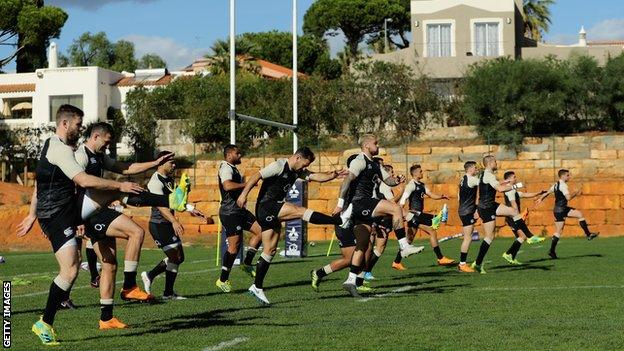
England prepared for this autumn's Test series with a camp in the Algarve
England v South Africa |
|---|
Venue: Twickenham Date: Saturday 3 November Time: 15:00 GMT |
Coverage: Live commentary on BBC Radio 5 live, the BBC Sport website and app; watch highlights on BBC Two, BBC iPlayer and online from 19:30 GMT. |
It is amazing how in 18 months, everything can change.
Fresh from a second successive Six Nations crown in 2017 and matching New Zealand's record of 18 straight Test wins, England would have been confident of pushing the All Blacks all the way.
Those thoughts of parity with the world's best are a long way gone now. Expectations have changed after six defeats in their last seven matches.
This autumn, facing South Africa, New Zealand, Japan and Australia, just two wins from four Tests would be a decent result for England.
Coach Eddie Jones has downplayed the importance of the results, claiming that England don't need to win any of their autumn internationals., external
And as odd as it may sound, I can see what he means.
If they were to lose to all three of the southern hemisphere big beasts, but produce really good performances and lose with narrow points margins, then there is not masses to be concerned about.
England would be close to beating those sides, with another 10 months to fine-tune and close the gap before Japan 2019.
If England get hammered though and the performances are diabolical, there will be huge ramifications.
England will have gone backwards and that falls on Eddie and his team not doing a great job either coaching or selecting.
The Rugby Football Union may rethink their commitment to the Australian, even this close to the World Cup. But I don't think that situation will arise. England at home will raise their game and find what they have been missing. They have to.
Jones still waiting on Tuilagi
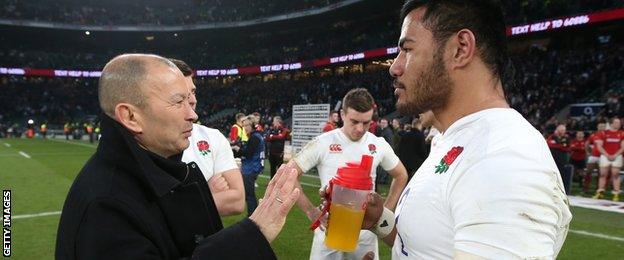
Eddie Jones debriefs Manu Tuilagi after the Leicester centre's one and only appearance during the Australian's England reign
Before he even got the job, Jones was talking about England's need to return to their traditional strengths of set-piece, defence and a 'bulldog spirit' after their dismal 2015 World Cup campaign.
A fit Manu Tuilagi would also have been a key part of his plans.
Instead the Leicester centre has been limited to just 17 minutes of action under Jones - coming on late in the win over Wales back in March 2016 - as he has struggled with a string of injuries.
The 27-year-old was primed for a comeback appearance off the bench this weekend against South Africa but has pulled out with a strain.
'10-12-13' starts under Eddie Jones | ||
|---|---|---|
Fly-half | Inside centre | Outside centre |
George Ford (28) | Owen Farrell (24) | Jonathan Joseph (21) |
Owen Farrell (2) | Luther Burrell (2) | Henry Slade (6) |
Danny Cipriani (1) | Alex Lozowski (2) | Ben Te'o (3) |
Source: Russ Petty, external/ESPN | ||
Saturday's line-up v South Africa | ||
|---|---|---|
Fly-half | Inside centre | Outside centre |
Owen Farrell | Ben Te'o | Henry Slade |
Jones had already flipped to a strategy that I believe he always wanted for his backline anyway.
Previously during Jones' reign, England have favoured a double-playmaker pivot with George Ford at fly-half and Owen Farrell at inside centre
While they were winning, it was hard to change, especially with the powerful Ben Te'o's own fitness and form fitful.
With the gainline-breaking power of both Te'o and Tuilagi initially in the squad to face the Springboks however, Jones has switched Farrell inside to 10 and to make way for the heavy-duty ball carrying option.
It was a similarly direct style that overhauled South Africa in the third Test in Cape Town in the summer.
There, in wet conditions, they played at their own pace, squeezing the Springboks with possession and territory, and keeping the ball in close quarters more.
It is less exciting perhaps, but more effective. And having Farrell at fly-half to orchestrate things is only a benefit.
Jones not to blame for cap-light back-ups
There are some stark statistics around the starting XV for Saturday.
A back row of Brad Shields, Tom Curry and Mark Wilson has a total of 10 caps between them.
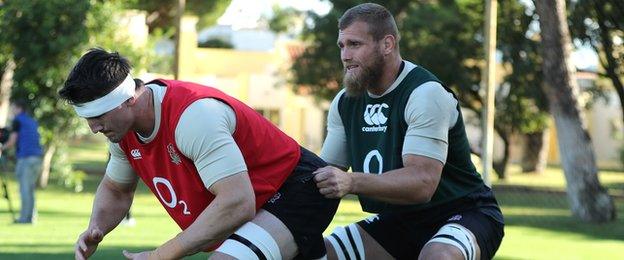
Tom Curry and Brad Shields are part of an inexperienced England back row
Prop Kyle Sinckler will be making only his fifth Test start. The man on the opposite side of the front row - Alec Hepburn - will be making his first.
Should Jones' fall-back options be so short of experience? Has he missed the chance to develop his second-string players by exposing them to more Test match action?
At international level, that is not a fair criticism.
You have to pick your best team every time you go out. You might get the odd match in an autumn series where you put out a side with less experienced players to give them the opportunity, but those chances are few and far between.
This current situation has been forced by the unforeseen absences of the likes of Billy and Mako Vunipola, Chris Robshaw and Joe Marler.
There has been considerable change off the field as well with John Mitchell coming in as a new defence coach and Australian Scott Wisemantel continuing in the attack role that he picked up in the summer., external
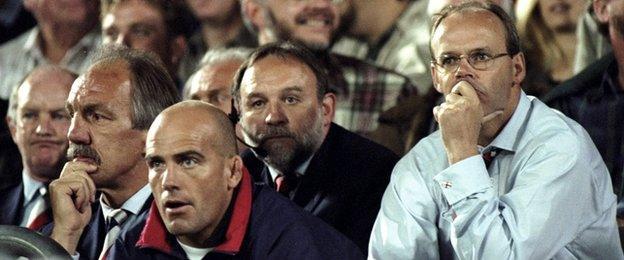
John Mitchell alongside Roger Uttley (left) and Sir Clive Woodward (right) during England's 76-0 defeat by Australia in Brisbane in 1998
That backroom churn can be disruptive with a change in systems, but it can also be galvanising and challenge the players in new ways.
It is Mitchell's second spell with England. He previously arrived as an assistant to Sir Clive Woodward in 1997 when I was part of the squad.
He was a great addition, bringing that breakdown nous to an England forward pack that was used to mauling. The Kiwi mentality around rucks is hard, but also smart.
They blew people out of the way, but did not over-commit numbers or leave themselves exposed to the counter-ruck.
The know-how that he added was a key part of what made the England forwards so good in the run-up to the 2003 World Cup.
If Carling made captains...
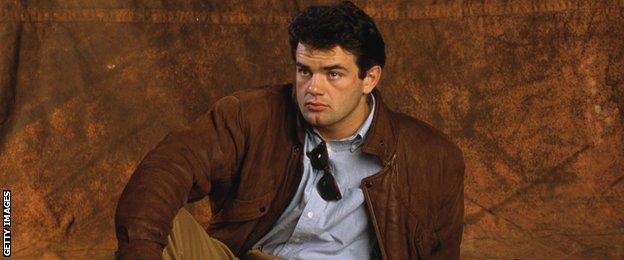
Appointed as captain at just 22, Carling quickly became one of the most famous faces of English rugby
One of my former England captains was announced as another addition to the England set-up this week.
Will Carling will work as a leadership mentor with the team.
Someone like 21-year-old Bath back rower Zach Mercer was not even born when Will played his last Test, but I still think he can bring something unique to the squad.
While the constant social media white noise is not something that we had to deal with, Will played rugby under the most intense scrutiny. He was often on the front pages as well as the back with his personal life and his 1995 stand against the RFU., external
He was made captain at the age of 22 and led a dressing room containing a fair few alpha male characters to three Grand Slams.
After retiring he helped companies with their leadership and management cultures and I'm sure that has added to his experience.
England's autumn internationals | |
|---|---|
3 November | South Africa |
10 November | New Zealand |
17 November | Japan |
24 November | Australia |
All matches at Twickenham | |
Will can potentially reinforce the current squad's mental resilience and hardness, but his biggest challenge will be getting the trust of the players.
And a lot of that depends on how he is introduced to the squad and his role is explained.
And a lot of that, as with everything else this autumn, will depend on Jones.
Jeremy Guscott was speaking to BBC Sport's Mike Henson.